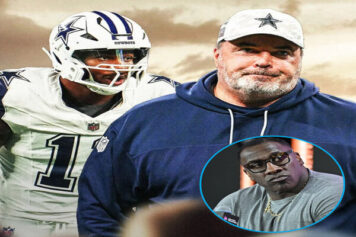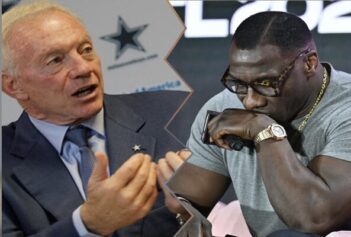This isn’t a story about football, although the Dallas Cowboys’ gifted wide receiver Dez Bryant is a phenomenal football player. He proved that yet again on Sunday night as he torched the Philadelphia Eagles secondary for six catches, 114 yards and three touchdowns to lift Dallas to a come from behind 38-27 road win, giving the Cowboys sole possession of first place in the NFC East.
But this isn’t a story about stats, eye-opening catches, rare athleticism or a push to return the venerable franchise to the playoffs.
Rather, it’s a story about growing up. As I’ve watched Bryant emerge into one of the best pass catchers in the National Football League, I’m always pulled toward another narrative, one this is bereft of touchdowns, playoff races or yards per reception.
With the NFL landscape filled with innumerable tales of steep falls from grace, whether it be the current sagas of Ray Rice and Adrian Peterson, the erosion of confidence in Commissioner Roger Goodell, the frightful idiocy and homicidal ideations of former players Aaron Hernandez and Rae Carruth, or the crème de la crème of all who have lost their status, respect and prestige, O.J. Simpson, pro football’s reality is far removed from the glitz and glamour that the daily media slobbering, fan adoration and weekly television productions would lead you to believe.
A few weeks ago, on November 9th, Dez Bryant put on one of the most magnificent performances that I’ve ever seen in a single quarter of pro football, when he caught six passes for a total of 158 yards and two touchdowns against the Jacksonville Jaguars at Wembley Stadium in London.
The entire arsenal of his mesmerizing skill set was on display in that second quarter: strength, size, speed, hands, the ability to make the most difficult catches seem routine and the open-field escapability that all, in one sincere conglomeration, cause General Managers to froth at the mouth and dream Super Bowl dreams.
In lieu of the aforementioned black eyes that the National Football League somberly walks around with, without even considering the suicides, debilitating after-effects of crippling physical injuries, brain trauma and the resulting damage that has ruined the lives of many retired players and their families, there was something within Bryant’s encapsulated performance and overall ascension that merits attention.
Dez Bryant, through his unique circumstances and problematical upbringing, had little chance at leading a successful and productive life. While we rubberneck at pro athletes that seem to lose their minds when they have the world at their fingertips, after acquiring the wealth and fame that many dream of, we don’t seem to appreciate the inverse of that – guys who actually grow through adversity to gain some maturity and perspective as they race away from the echoes of a painful past, gaining more distance with each touchdown reception and Pro Bowl selection.
Bryant’s mother was pregnant with him when she was a mere 14-year-old child. By the age of 18, she was a mother of three. At 19, when she was working as a short-order cook making $4.50 an hour, she began dealing crack-cocaine so that, as she told The New York Times in 2008, “My kids didn’t have to be hungry and the lights didn’t have to be turned off.”
She began using drugs around the same time as well.
Stability and structure are not words that would have described Bryant’s formative years. His behavioral outbursts in school landed him in special education classes while growing up in Lufkin, Texas. When he was eight years old, his mother was arrested for selling drugs to a police informant and she subsequently served 18 months in prison.
Sports, football in particular, provided some sort of compass. But the practices and games could not put a band-aid on the nomadic nature of his existence, which lasted up until he arrived at Oklahoma State University.
“I [took] him to probably six or seven different places he called home,” his former high school coach John Outlaw told The New York Times in 2008. “He was from trailer to trailer and house to house.”
A lot of colleges backed away from his recruitment because of his background and academic uncertainties. Looking at the Class of 2007 prospect rankings at the wide receiver position today, it’s almost comical to see names like Ronald Johnson, Terrence Toliver, Chris Culliver, Dwight Jones, Arrelious Benn, Duval Kamara, DeAngelo Benton and Deonte Thomspon ranked ahead of Bryant.
Dez has always seemed to be fighting against a negative perception, due to the imbalance in high school, college and early on in the NFL, between his immaturity and physical talent. He was often described as problematic, troubled and difficult.
But Cowboys coach Jason Garrett, one of Bryant’s staunchest supporters, succinctly summed up the conundrum of his star receiver, and the chasm between his image and the reality by simply stating, as he did to Sports Illustrated in September of 2013, “He had no structure in his life.”
As a sophomore at Oklahoma State, Bryant proved to be an elite NFL prospect after scoring 19 touchdowns and catching 87 passes for 1,480 yards. But the ‘Troubled’ label was again affixed to him when the NCAA suspended him for most of his junior season after he lied to investigators about a visit he’d paid to the home of Deion Sanders.
“I lied,” Bryant told Sports Illustrated last fall. “I didn’t take any gifts. But I should’ve told them I went to his home.”
Some who were unfamiliar with his circumstances, bought into the convenient image that was being cultivated, that Bryant was a troublemaker, a spoiled athlete who thought he was above the law. But those that knew him well, who knew how much of a success he’d been to even qualify for a college scholarship, profusely differed.
“He’s never been arrested,” Outlaw told the Lufkin (Texas) Times in 2009, railing against the draconian nature of the NCAA’s ruling. “He’s never tested positive for drugs. The only thing he ever did was lie when he got scared.”
In the 2010 NFL draft, despite being ranked by some as the top overall prospect, Bryant slid all the way until the 24th pick. There was the mind-numbing story of Miami Dolphins GM Jeff Ireland asking him during a pre-draft visit if his mother was a prostitute.
“My job is to find out as much information as possible about a player that I’m considering drafting,” Ireland said in a written statement that was later released by the Dolphins. “Sometimes that leads to asking in-depth questions. Having said that, I talked to Dez Bryant and told him I used poor judgment in one of the questions I asked him. I certainly meant no disrespect and apologized to him.”
“No, my mom is not a prostitute,” Bryant told Yahoo! Sports after the story surfaced. “I got mad, really mad, but I didn’t show it. I got a lot of questions like that: Does she still do drugs? I sat and answered all of them.”
DeMaurice Smith, the Executive Director of the NFL Players Association, released his own statement, saying, “During interviews, our players and prospective players she never be subjected to discrimination or degradation stemming from the biases or misconceptions held by team personnel. NFL teams cannot have the free reign to ask questions during the interview process which can be categorized as stereotyping or which may bring personal insult to any player as a man.”
So Bryant walked into the league with the asinine public perception of being a talented knucklehead with a sordid past, whose mother was a crack-head prostitute.
There were stories of him being thrown out of a mall because of sagging pants early on during his pro career that made national headlines, which made some detractors scream out, “See, I told you so!” The strict guidelines and structure that the Cowboys insisted on, which included avoiding strip clubs, abstaining from alcohol, a midnight curfew, being accompanied by team security at all times and mandatory counseling sessions provided fodder to the peanut gallery, who couldn't see that the franchise was doing what was best for a 20-year-old kid who'd had minimal structure in his life and no experience with millions of dollars at his disposal.
There was a reported incident of an assault on his mother, a charge that was dismissed. There were issues of lateness and missed meetings early on during his tenure with Dallas, which made the detractors rejoice some more.
“It’s not like I didn’t want to do things the right way,” Bryant told Sports Illustrated at the start of last season. “I just really never knew how to get there, if that makes any sense.”
Dez Bryant seems to be getting there now.
“Dez is one of my favorite teammates I’ve ever had,” future Hall of Fame Cowboys tight end Jason Witten told Sports Illustrated. “I gravitated toward him early because he has a passion for the game. What’s happening now is that he’s raising the bar for himself. He’s attacking meetings the same way he attacks practices and games. He’s becoming a true pro.”
With all of the negativity surrounding the NFL these days, it’s kind of refreshing to see how far Dez Bryant has traveled in a very short amount of time. He seems to be the antithesis of a guy who once had it all, only to fall from the mountaintop later.
Yeah, the football story is kind of cool. The guy does things like Michael Jordan once did, in terms of defying the natural laws of physics within the athletic realm. But this isn’t a story about football at all, remember?
It’s a story of a young man who started at the bottom, who was never given the chance to fall from grace because he’d been relegated to the trash heap from day one.
But climbing toward grace, as opposed to falling from it, is a much better story as far as I’m concerned.



